Iran slams U.S. over comments on Iraqi troops fighting Islamic State

Iraqi government forces pose for a picture at a checkpoint in the Jurf al-Sakher area about 30 miles south of Baghdad.
The war of words between Iran and the United States is getting testier as the two nations’ common enemy, Islamic State militants, advance in Iraq and Syria.
The man acclaimed in some circles as Iran’s military “mastermind,” Maj. Gen. Qassem Suleimani, derided the progress of President Obama’s stated goal to “degrade and ultimately destroy” Islamic State.
“Mr. Obama, you have not done a damn thing in Iraq,” Suleimani bluntly declared Sunday, addressing the president rhetorically before a gathering of revolutionary guards in Kerman, in southeastern Iran, Iran’s Mehr News reported. “You have no will to confront Daesh,” Suleimani added, using the Arabic term for Islamic State.
The ongoing U.S.-led bombing campaign against Islamic State apparently does not impress the fabled commander of the Revolutionary Guards’ elite Quds force.
Suleimani’s denunciation appeared to be a riposte to Secretary of Defense Ashton Carter, who told CNN on Sunday that Iraqi forces “showed no will to fight” Islamic State in Ramadi. The Iraqi military retreated last week as militants overran the strategic city in western Iraq.
The comments from Suleimani, who has been seen on the front lines in Iraq, echoed those of Iraqi Prime Minister Haidar Abadi, who also defended his troops while being dismissive of Carter’s statement.
The verbal broadsides are another illustration of the awkward geopolitical realities of the Iraqi battlefield, where Washington and Tehran are fighting on the same side — though neither government wants to acknowledge that fact.
Both the United States and Iran back the Baghdad government and both are heavily involved in training and supplying Iraqi forces fighting Islamic State. But the two longtime adversaries do not publicly concede any cooperation.
Whether the Iraqi units that withdrew from Ramadi received U.S. or Iranian training was not clear. Video footage showed Iraqi troops speeding away in U.S.-donated Humvees as militants closed in on the city.
Washington invested billions of dollars in training and equipping Iraqi military and police forces during the U.S. occupation between 2003 and 2011. The United States resumed a robust training program last year after Iraqi forces fled en masse from Islamic State fighters sweeping into northern Iraq.
Shiite Muslim Iran has been a major benefactor for mostly Shiite militias in Iraq. The irregular forces are widely viewed as the most effective fighters on the ground against Islamic State, a Sunni Muslim group and Al Qaeda breakaway faction.
Thousands of Shiite militiamen have been rushed into action to take part in a planned counterattack on Ramadi, the capital of Al Anbar province. But many fear the militias’ presence in the Sunni heartland could worsen resentment among residents.
In recent days, a number of senior Iranian commanders have warned of planned “proxy wars” directed against Iran, including from Iraq, which shares a 900-mile border with Iran. Commanders have vowed they will take action if Islamic State forces advance in Iraq to within about 25 miles of Iranian territory.
In his comments, Suleimani said Iran was doing more than any other country to battle the “plague” of Islamic State.
“Our human responsibilities do not allow us to witness the crumbling of a nation under such atrocities,” Suleimani said.
The commander, long a shadowy, reclusive figure, has become a national hero in Iran as his role in helping battle Sunni militants in Iraq and Syria has put him in the public spotlight. His exploits have also made him an outsized figure on social media, where his reported feats, often exaggerated, have prompted one wag to dub him “Supermani.”
But Suleimani insists he eschews the limelight, describing himself publicly as a humble servant of Iran’s supreme leader, Ayatollah Ali Khamenei. Recently, he penned a public letter declining an offer from a well-known Iranian filmmaker to make a movie about his life.
“I am a soldier full of weaknesses,” Suleimani wrote. “If not for the grace of God, it is not clear if I would have achieved any of these successes.”
Special correspondent Mostaghim reported from Tehran and Times staff writer McDonnell from Beirut.
Follow @mcdneville on Twitter for news out of the Middle East
More to Read
Sign up for Essential California
The most important California stories and recommendations in your inbox every morning.
You may occasionally receive promotional content from the Los Angeles Times.





